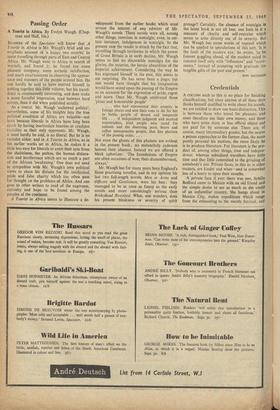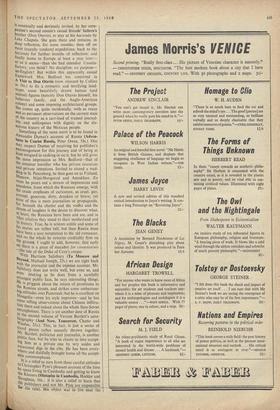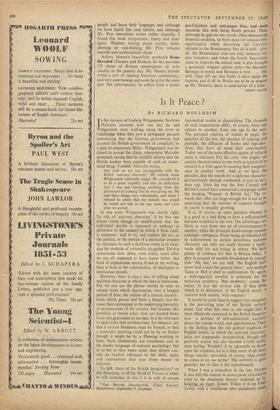Credentials
A COLUMN such as this is no place for finicking classifications, but since anyone at all these days thinks himself qualified to write about his travels, we are entitled to draw one basic distinction. This is between those who travel for pleasure, and must therefore use their own money, and those who have some more or less official object and are paid for by someone else. There are, of course, many intermediary grades; but the nearer a person approaches to the former class, the more purely personal his motives, the more likely he is to produce literature. For literature is the pro- duct of, among other things, time and indepen- dence; whereas subsidised travellers have little time and that little committed to the grinding of somebody's axe. Private faces, in this as in other matters, are kinder and wiser—and in somewhat less of a hurry to open their mouths.
A private face if ever there was one, Sybille Bedford came to Mexico with an old friend and the simple desire to see as much as she could of an unfamiliar country. She hangs about in Mexico City, makes expeditions which range from the exhausting to the merely farcical, and is eventually and deviously invited, by her com- panion's second cousin's casual friends' fathers's brother (Don Otavio), to stay at his hacienda by Lake Chapala. She goes there and remains, in deep reflection, for some months; then off on more (equally random) expeditions; back to the hacienda for further months of reflection; and finally home to Europe at least a year later— or so it seems—than she had intended. Unsatis- factory, you think? No discipline, no purpose- un-English? But within this apparently casual framework Mrs. Bedford has contrived in A Visit to Don Otavio (now reissued by Collins at 16s.) to fix a romantic and terrifying land- scape, some beautifully drawn human (and animal) figures (notably Don Otavio himself, his ludicrous family, and the Anglo-American c,°,101.1Y) and some imposing architectural groups. She comes up, quite incidentally, with as many and as pertinent observations on the current state of the country as a cart-load of trained journal- ists, and soliloquises with dignity on the dis- astrous history of the Mexican people. Something of the same merit is to be found in Alexandre Dumas's account of Russia (Adven- tures in Czarist Russia, Peter Owen, 18s.). One may suspect Dumas of receiving his publisher's encouragement for this journey and of being at least resigned to cashing in on it, but he still gives the same impression as Mrs. Bedford—that of the amateur traveller who has private resources and private intentions. Invited to attend a wed- 1.ing in St. Petersburg, he then goes on to Finland, moscow, Nijni-Novgorod and Astrakhan. En route he pours out a stream of impressions and anecdotes, from which the Russians emerge, with the crude emphases of caricature, as cruel, gay, corrupt, generous, dirty, drunken or brave; yet none of this is mere journalism or propaganda, for beneath the chatter and the vodka and the shouts of laughter is the desire to discover what, at heart, the Russians have been and are, and in what relation they stand to their motherland and its history. True, he is seldom subtle and some of his stories are rather tall; but then Russia must have been a sore temptation to the old romancer, and on the whole he remains creditably firm on the ground. I ought to add, however, that early on there is a piece of macabre for connoisseurs --the tale of the Duke of Croy's corpse. With Harrison Salisbury (To Moscow and Beyond, Michael Joseph, 25s.) we are right back
With the journalist and the expense account. Mr. Salisbury does not write well, but even so, and even peaking as he does from a carefully ,arranged public face, he says interesting things.
tie is Priggish about the return of prostitutes to
the Russian streets, and strikes some embarrass- ing attitudes over Pasternak; but he is excellent on
Mongolia—even his style improves—and he has
some telling observations about Chinese infiltra- tion there and indeed about the whole Sino-Soviet
entanglement. There is yet another dose of Russia 10 the second volume of Vernon Bartlett's auto- biography (And Now, Tomorrow, Chatto and
Windus, 21s.). This, in fact, is just a series of travel pieces rather uneasily thrown together. Mr. Bartlett, politician and journalist, is another public face, but he tries to charm 'us into accept- ing him as a private one by wry asides and occasional digs in the ribs. He has been every- Where and dutifully brought home all the accept- able commonplaces.
It is a relief to turn from these careful attitudes to Christopher Pym's pleasant account of the time .0,e spent living in Cambodia and getting to know 1e Khmers (Mistapim in Cambodia, Hodder and
...n
t ughton, 16s.: it is also a relief to learn that the Publishers and not Mr. Pyin are responsible lOr the title). His object was to live near the people and learn their language; and although we have heard this tune before, and although Mr. Pym sometimes writes rather clumsily, I found this book sympathetic, funny and intel- ligent. Whether writing about royalty, betel- chewing or rain-betting, Mr. Pym remains equable and unobtrusively sharp.
Aubrey Menen's beautifully produced Rome Revealed (Thames and Hudson, £4 4s.) provides 151 plates of Roman masterpieces ab urbe conduct to the present day. Mr. Menen himself writes a sort of running historical commentary, and very entertaining and acute he is for the most part. But unfortunately he suffers from a severe pro-Christian and anti-pagan bias, and must reconcile this with being firmly pro-art. Thus, although he gets on very nicely when denouncing Imperial crudities, he finds need for considerable equivocation when discussing the Church's attitude to the Renaissance. But all is well : alter all, the Renaissance was not only immoral but also imitative, and when the lovely Inquisition came to improve the ethical tone, it also brought a genuinely original artistic style—the Baroque. Baroque is moral and Baroque is best. . . . Ah, well. They tell me that Faith is once again the fashion, and if all its Works are to be as elegant as Mr. Menen's, there is consolation of a kind.
SIMON RAVEN
















































 Previous page
Previous page